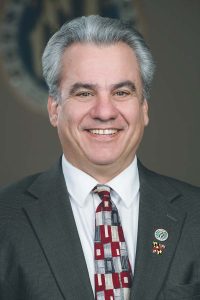The county’s highest ranking elected official delivered some candid criticism of state lawmakers at last week’s Maryland Association of Counties summer conference.

Chip Bertino
By Steve Green, Executive Editor
The county’s highest ranking elected official delivered some candid criticism of state lawmakers at last week’s Maryland Association of Counties (MACo) summer conference.
“Worcester County continues to be negatively impacted by decisions of the state legislature and state agencies regarding wind turbines and solar power fields that are usurping local autonomy and threatening our community’s way of life,” said Worcester County Commission President Chip Bertino last week in Ocean City during the MACo gathering.
Bertino posted an adapted version of his opening remarks on his Facebook page over the weekend and sent the comments to this newspaper as a letter to the editor. Bertino has long been critical of state mandates that shift financial burdens to the county jurisdictions, such as recent state decisions that place more health department spending on county governments. In his commentary, Bertino pointed out Worcester County’s tourism spending tops $2.5 billion annually, resulting in over 13% of Maryland’s visitor spending.
“Our county is founded on three economic drivers: tourism, which generates state and local revenues; commercial and recreational fishing, which are served by the West Ocean City harbor, the only commercial harbor in the Mid-Atlantic region with ocean access; and finally, agriculture, which is dependent on healthy soil to grow crops and to nourish livestock that feed the county, the state, and the nation,” Bertino said. “Today, all three of Worcester County’s primary economic drivers that earn billions of dollars for the state treasury, that employ thousands of workers here and across the state and nation, and that attract millions of tourists annually are falling prey to greedy, external predators. Concerns raised, and requests made by the County Commissioners for assistance have been ignored repeatedly by those most in a position to help and by the institutions of government that smile upon the promises of foreign business interests that rely heavily on taxpayer subsidies to fund their uncertain startups, while turning a blind eye to the disastrous consequences that result locally.”
The most recent subject of ire, specifically, is the offshore wind farm under development and on a fast track to reality.
“Our seaside horizon has been auctioned for windfarms. … The impact of these monstrous structures should prick the conscience of all of us who value the splendor of the environment,” Bertino said. “Testing procedures are wreaking havoc on fragile aquatic life. Dead whales on the beach. Disoriented dolphins washing ashore. The threat to horseshoe crabs, which are critical to cancer and other medical research, is said to be unknown. … The negative impact on our fishing industry is unconscionable. Plans to construct an oversized concrete pier in the West Ocean City harbor – established specifically as a commercial marine zoning district in 1999 – will obliterate local fishing industries.”
On a different topic, Bertino also reiterated a concern shared recently by commissioners during a public presentation from MACo officials on solar panels on farmland.
“Like many rural counties across the state, Worcester’s farmlands are under attack. The state is approving solar fields for large companies while denying the rights of local governments to apply their own zoning codes that reflect local values, objectives, and ways of life. Fertile farmlands are being plowed under by major companies who seek unfettered profits on historically low-taxed fields.”
Bertino added, “The people of our county are being disrespected. Yet, it’s hoped that opportunities can be found through cooperative discussions with the state that we will ultimately blaze a path forward that respects Worcester County’s way of life, its environment and its commerce.”
On Saturday, Aug. 17, Gov. Wes Moore (D) closed the MACo convention touting his administration’s successes and stressing the positives in Maryland.
“… Our first year and a half in office has been guided by a single question: How do we get Maryland’s economy growing again? When I entered office, our economy wasn’t just stagnant – it had stalled. From 2017 to 2022, the national economy grew by 11%. Maryland’s economy grew by just 3%. We ranked consistently low on affordability, wages, population, education, labor force participation, and employment,” Moore said. “But spending increased by 70% during the seven years just before I took office. So we were spending more but we weren’t growing more. Problems beneath the surface were hidden by billions of dollars in federal money to get us through COVID. But billions of dollars from the federal government was not a “structural surplus.” It was a sugar high. So to balance the equation, we knew we had to prioritize growth. Our strategy has been centered on building new pathways to three north star priorities: Work, wages, and wealth.”
